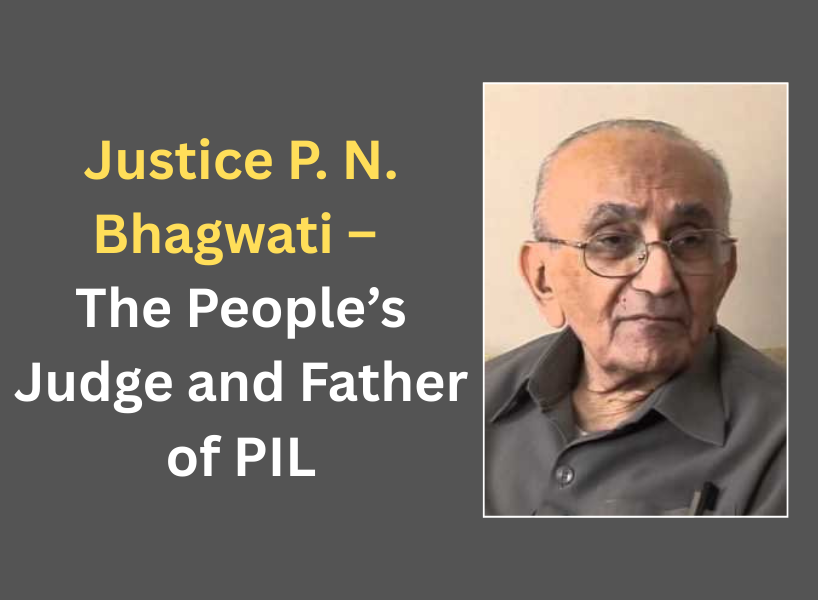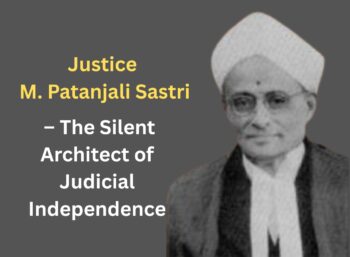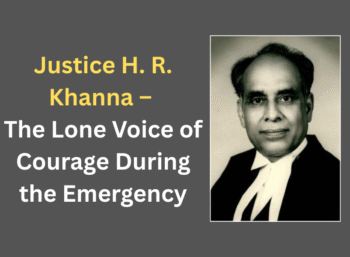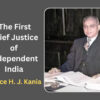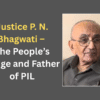Some judges change the course of law; a few rare ones change the very purpose of law. Justice Prafullachandra Natwarlal Bhagwati, the 17th Chief Justice of India, belonged to that rare category. His story is not just about a man who interpreted the Constitution; it is about a visionary who opened the doors of justice to the poorest and weakest of society.
🌱 Early Life and Influences
Born in 1921 in Gujarat, Bhagwati grew up in a family that deeply valued education and public service. His father, N. H. Bhagwati, was himself a judge of the Bombay High Court. But for young Prafullachandra, life was never about walking in his father’s shadow.
In his youth, he was influenced by the freedom struggle and the ideals of social justice. He often said that the law should not remain confined to the privileged but must serve those who had no voice. That belief would later define his career.
⚖️ The Rise of a Reformer
Bhagwati started as a lawyer at the Bombay High Court, but it was on the bench that his true vision unfolded. In 1973, he was appointed to the Supreme Court of India.
The India of the 1970s was in turmoil — poverty, inequality, and political unrest marked the times. Courts were often criticized for being inaccessible to the poor. It was in this environment that Justice Bhagwati revolutionized the concept of justice.
🌟 The Birth of PIL
Perhaps his most remarkable contribution was the introduction of Public Interest Litigation (PIL) in India.
Traditionally, only someone directly affected by a case could approach the courts. But Justice Bhagwati broke this barrier. He declared that even a stranger could approach the court on behalf of the poor, the illiterate, or the marginalized.
For the first time in history, prisoners, bonded laborers, street children, and slum dwellers could have their voices heard in the Supreme Court — often through a simple postcard addressed to the judge.
Imagine that — the mighty Supreme Court responding to a humble letter from a citizen. That was Bhagwati’s vision: a judiciary that truly belonged to the people.
📜 Landmark Contributions
- Prison Reforms: He ordered improvements in jail conditions, recognizing that even prisoners had basic human rights.
- Bonded Labour: In cases like Bandhua Mukti Morcha, he fought against the exploitation of bonded laborers.
- Environment & Human Rights: PIL became a tool to protect forests, rivers, and even the right to a clean environment.
Through his judgments, he reminded the nation that justice is not a luxury for the rich but a right for all.
🙏 Criticism and Courage
Justice Bhagwati was not without critics. During the Emergency (1975–77), he supported some controversial decisions that upheld government powers. Many saw this as a stain on his otherwise remarkable career. But to his credit, Bhagwati later admitted his mistake and expressed regret.
This honesty — the ability to admit an error publicly — showed the measure of the man. He was human, but he was also courageous enough to acknowledge his flaws.
🌍 Legacy
By the time he retired in 1986, Justice Bhagwati had transformed the Supreme Court from a distant ivory tower into a people’s court. Today, PIL is one of the most powerful tools for justice in India, and it is impossible to imagine our judiciary without it.
Every time a social activist files a PIL for environmental protection, or a citizen seeks justice for the marginalized, they are walking the path that Bhagwati created.
💡 Lessons for Today’s Generation
Justice Bhagwati’s life is a lesson in empathy and vision.
- Justice must serve the weak. True progress is measured not by how the powerful are treated, but by how the powerless are protected.
- Innovation matters. He showed that law is not static; it can evolve to meet society’s needs.
- Humility counts. Admitting mistakes makes a leader stronger, not weaker.
✨ Closing Thought
Justice P. N. Bhagwati will always be remembered as the “People’s Judge.” He didn’t just interpret the Constitution; he brought it alive in the lives of millions who never dreamed of stepping into a courtroom.
His story reminds us that the law is not about cold statutes or technical jargon. It is about humanity, compassion, and the courage to ensure that justice reaches even the last person standing at society’s margins.

